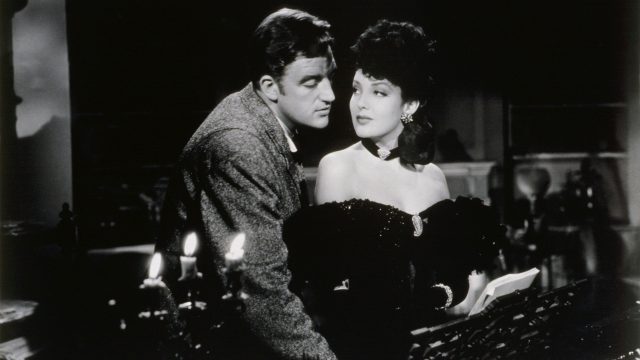John Brahm’s moody Hangover Square is a fine example of gaslight noir. The cinematography and costumes are warm and inviting, as if this Edwardian London is, in good period-drama form, full of rich sensory details, the past a collage of lush fabrics, boisterous pub choruses, and swirls of smoke. But the noir edge cuts through it all, chilly and discordant, and as the film goes on, the sensations we’re experiencing shift. The friendly lighting gives way to viciously crackling bonfires. Like the film’s protagonist, composer George Harvey Bone (Laird Cregar), we find that the clash and clatter always intrude.
When George is in the heat of composition, he’s attuned to every sound–and harsh, ugly ones make him black out. Those blackouts are getting longer, and now he’s found blood on his clothes and a knife in his pocket. He clings to the possibility that he’s not a killer, and–on the advice of a criminal psychologist–tries to seek out entertainment to keep from the kind of overwork that precedes his blackouts. On one ill-fated night, he takes in a lively, burlesque-adjacent music show featuring the ambitious Netta Longdon (Linda Darnell), and he falls into an erotic obsession. Netta’s feelings for him as a person never rise above “tepid” and “irritated,” but she cozies up to him because he’s a well-regarded composer who is suddenly willing to churn out music hall songs to bolster her career. Sooner or later, we know, her contempt will win out over his passion–and it will, in effect, be another jarring noise, something George’s refined sensibilities can’t tolerate.
On the surface, Hangover Square argues that George is a victim of his own mind, and this is true to some extent. He genuinely has trouble remembering what he’s done during his blackouts*, and–at least early on–he makes a sincere attempt to discover whether or not he’s done something horrible. But like nearly all noir protagonists, George is weak in the face of temptation. He ignores the numerous signs that Netta is only interested in him as a professional resource, and his earlier romantic and professional attachments–his near-fiancée and her esteemed conductor father, his need to finish his concerto on schedule–fall by the wayside. It’s passion, yes, but it’s a passion that’s marked primarily by jealousy and callousness. When George refuses his girlfriend’s invitation to the Philharmonic only to impulsively invite Netta to come with him to the same performance, it’s a breathtaking bit of careless cruelty. After a while, it’s hard to accept George as a fundamentally good man with a particularly awful (and particularly cinematic) ailment. The violence during his blackouts starts to seem more targeted, more anchored in his conscious passions and resentments; less aberrations than inhibition-free extensions of his own solipsism.
It’s in this uneasy space that Hangover Square really thrives. It’s at its best when George’s character and culpability are in an uneasy muddle, when the actions are clear but their meaning is not. This is where we get an absolutely spectacular Guy Fawkes sequence: throw the unsolvable tangle into the fire. The psychological angle here is more complex than the initial presentation would suggest, but even so, it benefits from being shoved, Freud-like, into the cellar beneath the grotesque, theatrical events.
Hangover Square is streaming on the Criterion Channel.
* This comes up early on, but it’s even more plainly substantiated by the fate of carriage cat, distant ancestor of oven cat. No, I don’t intentionally pick films where animals meet weird, macabre fates. Yes, I know that neither you nor my own cats believe me at this point.

